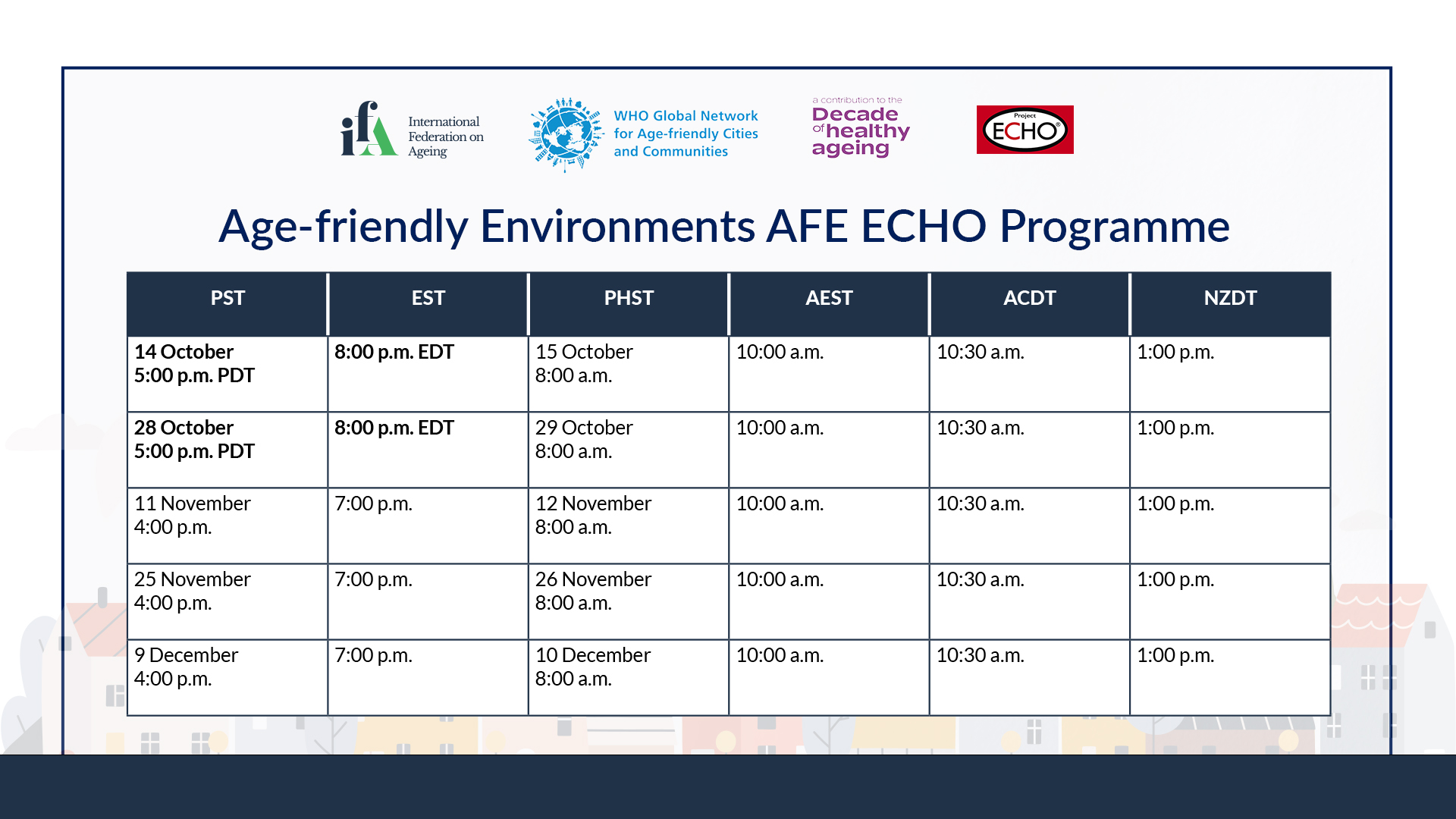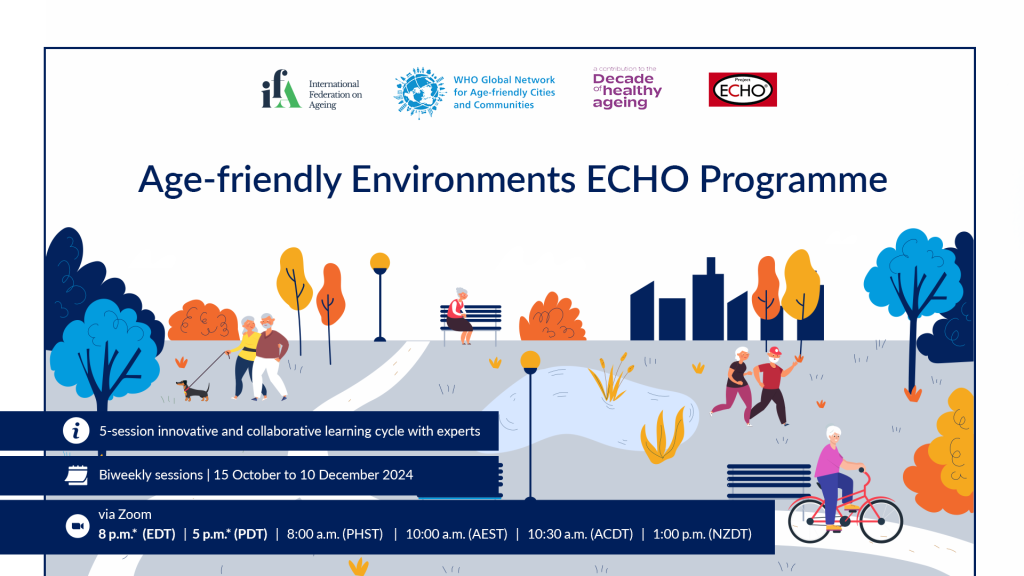Age-Friendly Environments (AFE) ECHO Programme
The WHO Global Network for Age-friendly Cities and Communities (GNAFCC) was established in 2010 to connect cities, communities and organizations worldwide with the common vision of making their community a great place to grow older in. The mission of the Network is to stimulate and enable cities and communities around the world to become increasingly age-friendly.
Given the extensive experience of Network Affiliates and members, there is an opportunity for more experienced leaders to mentor those that are new to this work. Recognizing the invaluable benefits that Mentorship programmes provide, the WHO set up, with support from the International Federation on Ageing (IFA), the Age-friendly Environments Mentoring Programme (MENTOR-AFE) to help develop and strengthen skills and competencies of individuals through one-to-one mentor-mentee relationships.
The programme generated a high number of requests which could not be fully met through the mentor-mentee programme. To respond to the demand, WHO and IFA have developed another initiative under this programme: Age-Friendly Environments (AFE) ECHO – a multi-session learning cycle, developed and guided by the needs of mentee applicants and aligned with approaches and guidance from WHO on age-friendly cities and communities.
Registration Open Now!
3rd English Edition of the Age-Friendly Environments AFE ECHO Programme
15 October to 10 December
On behalf of the World Health Organization (WHO) and the International Federation on Ageing (IFA) it is a pleasure to invite new and emerging leaders of age-friendly cities and communities from around the world to participate in an innovative and exciting learning opportunity: the third English edition of the Age-friendly Environments (AFE) ECHO Program hosted from 15 October to 10 December 2024. Delivered with the support of colleagues at the WHO Western Pacific Regional Office (WPRO), Government of Western Australia, Government of Queensland, and Government of New Zealand, the program will provide a safe environment where participants can share knowledge and learn from experts and other learners through collaborative problem-solving, to gain the skills necessary to advocate and drive the age-friendly model within their own city and/or community.
Schedule and Sessions
15 Oct - Introduction to the Age-friendly Journey
29 Oct - Engage and Understand
12 Nov – Plan Strategically
26 Nov- Act and Implement
10 Dec – Monitor and Evaluate Progress
14 Oct - Introduction to the Age-friendly Journey
28 Oct - Engage and Understand
11 Nov – Plan Strategically
25 Nov- Act and Implement
9 Dec – Monitor and Evaluate Progress
The Age-Friendly Journey: An Introduction
Globally populations are ageing and increasingly in towns and cities rather than rural and remote areas. The experience of older age and the opportunities it affords are strongly influenced by the physical and social environments in which we are born, live, play, work and age. By creating supportive and inclusive places with the right policies and services, communities can create environments that empower older people to be and do what they have reason to value.
Key principles for creating age-friendly cities and communities around the world include the participation of older people, equity, intersectoral collaboration, life-course approach and multilevel governance. These will all be explored in the first session.
Learning objectives:
Participants will be able to:
- Improve understanding of the importance of age-friendly environments in the context of a life-course approach to healthy ageing and in response to key megatrends – urbanization and demographic change
- Understand the history and key features of the WHO Age-friendly Communities Framework and programme cycle
- Understand what an age-friendly community can achieve.
Engage and Understand
The engage and understand phase is critical to the needs and experiences of older people and other communities’ members in order to gain political commitment and generate ownership among all stakeholders.
Knowing how to start this process, who to engage and what tools are available to support this process notably to do a context analysis and an age-friendly assessment are the subject of this session.
Learning objectives:
Participants will be able to:
- Describe mechanisms to build a network of stakeholders
- Describe steps to identify the needs of the older population
- Understand steps needed to analyze the challenges and opportunities in a community and define priorities for action
- Describe strategies used to influence and inform the political commitment for age-friendly initiatives
- Describe what successful engagement looks like and the anticipated outputs
Plan Strategically
Developing and implementing a comprehensive age-friendly strategy, that aligns with the needs and assets of older people requires local stakeholders across sectors to agree on a common vision, identify priorities, and develop a plan that leverages the strengths of various stakeholders.
How to create a shared vision and develop a strategy and action plan informed by the findings of the context analysis and age-friendly assessment and ongoing deliberations with stakeholders is the focus of this session.
Learning objectives:
Participants will be able to:
- Describe the purpose, process, and key success factors in delivering an age-friendly strategy and action plan.
- Describe the steps needed to develop a comprehensive strategic plan
- Understand the importance of defining common objectives, aims, targets and stakeholder responsibilities
- Identify strategies for securing support and resources;
Act and Implement
Taking action is at the heart of efforts to create an age-friendly city or community. After the assessment, consultation, and strategic planning stages, concrete actions need to be taken.
There are a large number of actions that can be taken to impact the lives of older people. Considering scientific evidence on effectiveness, estimates of costs of investment, stakeholders’ experiences of implementing similar interventions, outcomes and impact can inform the action plan. Action planning and coordinating different stakeholders, while keeping older people meaningly engaged in the process, are all key to bringing about transformative change are the focus of this session.
Learning objectives:
Participants will be able to:
- Understand the importance of consulting on the action plan and involving older people at all stages
- Describe the process for designing a successful action plan
- Understand the steps needed to implement an action plan; and scale up successful action
- Understand the importance of learning from successful action in local, national and international networks
Monitor and Evaluate Progress
The success and sustainability of an age-friendly action plan is measured by its ability to show achievements but also to evolve in response to local changes in context and needs. This depends on robust monitoring and evaluation.
Understanding whether a community has become more age-friendly (outcome and impact assessment) and how a community has become more age-friendly (process evaluation) can demonstrate the benefits of the actions but also help to sustain political commitment and ensure future funding for age-friendly initiatives.
Learning objectives:
Participants will be able to:
- Describe the steps needed to monitor processes continually
- Understand the principles needed to undertake both outcome and impact evaluations
- Describe strategies for sustaining and improving action informed by evidence
The Anatomy of an ECHO
AFE-ECHO participants are taken through the main components of the WHO age-friendly framework by global experts, towards building competencies to lead, influence, and implement the development of age-friendly environments. Each session will also create a space for participants to apply what they learn through collaborative problem-solving. AFE-ECHO create a forum where participants learn from one another by refining and testing knowledge through local case studies, with a long-lasting impact far beyond that of a webinar or an e-learning course.
AFE-ECHO comprises five 1-hour sessions, taking place bi-weekly over a 3-month period, and are held in virtual format over Zoom. Following the standards of the ECHO model, participants are expected to attend all sessions, as the experience and knowledge are cumulative. Every AFE-ECHO learning cycle focuses on four key areas:
- Engage and Understand
- Plan Strategically
- Act and Implement
- Monitor and Evaluate Progress
The ECHO Model has been leveraged across many fields including education and social justice. There are more than 860 ECHO networks in 44 countries that have trained more than 148,000 learners from 30,000 organizations,
Project ECHO is a hub-and-spoke model which connects organizations (the “spokes”) with a group of experts (the “hub”). Drawing on a proven standard format and process for learning and building knowledge, during each AFE ECHO session a didactic lecture from a subject matter expert sets the specific context which is followed by a learner presenting a case to the other experts and learners for discussion and recommendations. Participants learn from one another as knowledge is tested and refined through a local lens.
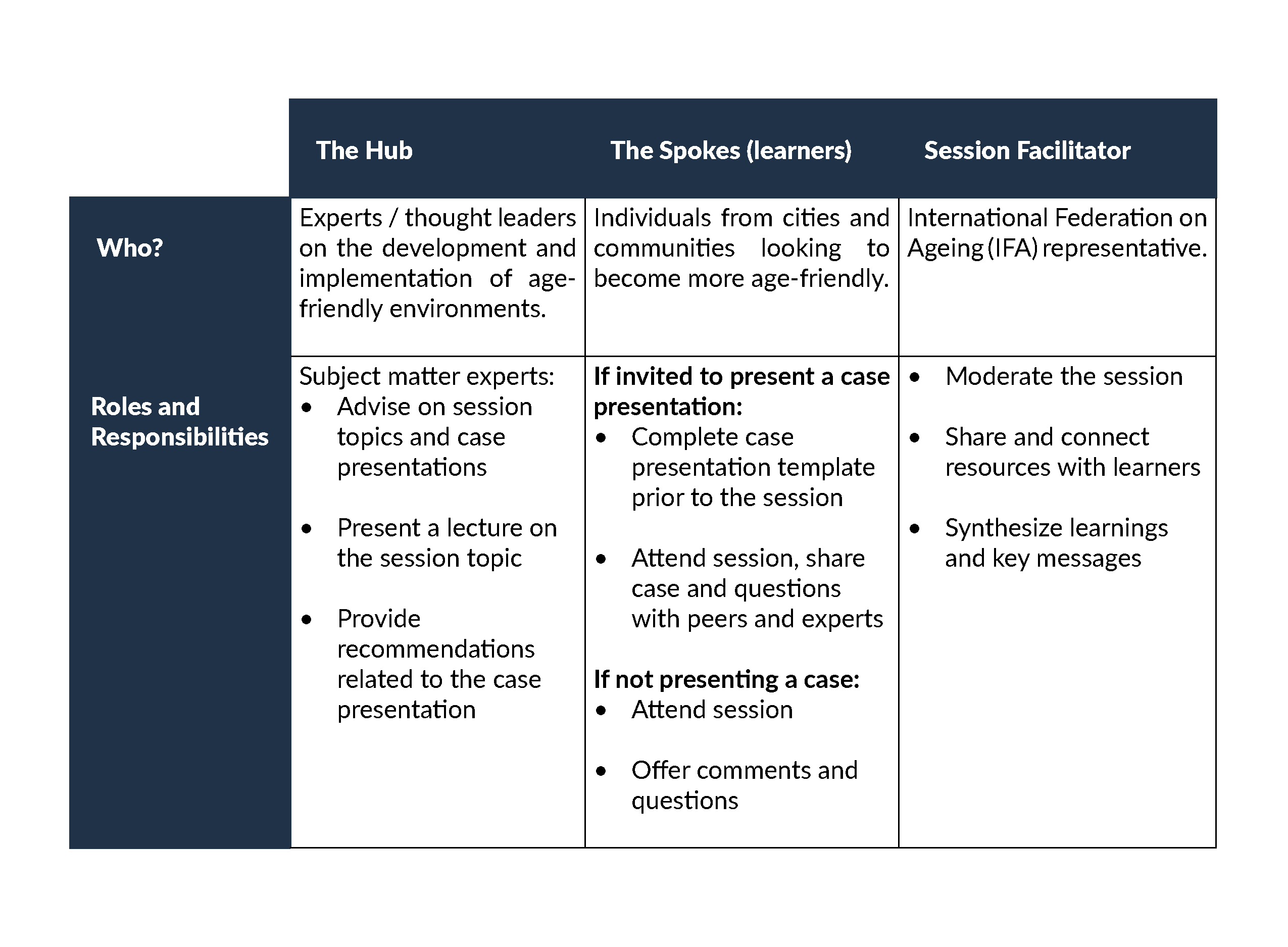
The Hub Team
Dr Kathleen Brasher
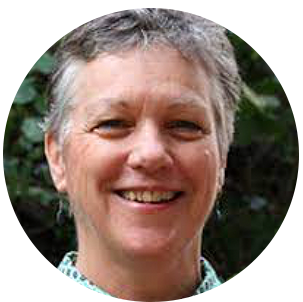 Dr. Kathleen Brasher
Dr. Kathleen Brasher
Research Fellow, John Richards Centre for Rural Ageing Research, La Trobe University
Kathleen is a social gerontologist with a long involvement in the health and community sectors as a clinician, academic, advocate and in policy and program development and evaluation. Kathleen has been a part of the international Age-Friendly movement since 2006 where she contributed original research to the World Health Organization Global age-friendly cities: a guide.
She is an advisor to the WHO Global Network for Age-friendly Cities and Communities, and has advised state and local governments, and older person’s advocacy organisations, across Australia and New Zealand.
Jean Lagan
 Jean Lagan
Jean Lagan
Principal Policy Officer – Seniors and Carers, Queensland Government
Jean has over 20 years’ experience across the public, private and not-for-profit sectors in research, policy development, program delivery, legislation, and administration. Since joining the Queensland Government in 2010, she’s made significant contributions, including enhancing the Motorcycle Licensing program for improved rider safety, introducing the Queensland Indigenous Procurement Policy, and supporting transparency and accountability in local governments. Jean joined the Seniors and Carers team in 2023 and has an interest in First Nations history and culture. She continues to learn about the central role of Elders within Aboriginal and Torres Strait Islander communities, as knowledge holders, advisors,and cultural leaders.
Outside of her professional life, Jean is a mother and actively contributes to her local community.
Monique Montey
 Monique Montey
Monique Montey
Manager, Strategy and Reform – Seniors and Carers, Queensland Government
Monique joined the Queensland Government’s Seniors and Carers Team within the Department of Child Safety, Seniors and Disability Services in 2023. As the Manager of Strategy and Reform, she oversees a range of programs for older Queenslanders including elder abuse prevention and intervention services, Seniors Card program and concession services. Monique also leads a team of policy advisors who recently launched An Age-friendly Queensland: The Queensland Seniors Strategy 2024-2029, supported by a whole of government action plan aimed at improving the lives of older Queenslanders.
With 17 years of experience of working with adults with impaired decision-making capacity, Monique brings extensive expertise in operational service delivery to her current role. Her expertise ranges across disability, aged care, elder abuse and domestic and family violence. Monique has a passion for human rights advocacy and her work has focused on ensuring vulnerable adults receive the support they need to live lives free from abuse and neglect. In her current position, Monique aims to further develop and implement strategies that enhance the quality of life for older Queenslanders.
Diane Turner
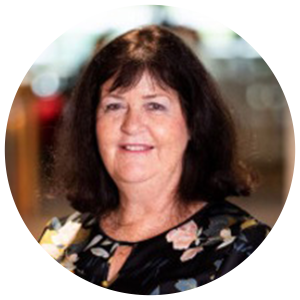
Diane Turner
Director Officer of Seniors, Te Tari Kaumātua
Diane has been the Director Officer of Seniors (Te Tari Kaumātua) since October 2016. Diane and her team are based in the Ministry of Social Development in Wellington. Their job is to support the Minister for Seniors to advocate for the issues and interests of older people.
As well as leading the implementation of the national strategy for our ageing population, Better Later Life – He Oranga Kaumātua, the Office for Seniors is the primary advisor to the Government on the rights and issues of older people. The team also works with local councils, NGOS, community organisations, academics, and researchers. The Office has been leading the national programme for the development of Age friendly cities and communities and now has half of the local councils as members of their Age friendly network.
Diane spent thirty years working in local government, including five years as CEO of the Whakatāne District Council. She also had five years based in Christchurch in senior roles at the Canterbury Earthquake Recovery Authority and Te Runanga o Ngāi Tahu
Diane has a Bachelor Social Sciences from Waikato University, a Bachelor Town Planning from Auckland University and a Master Business Administration from Massey University. She is also a Justice of the Peace.
Dr. Mikiko Kanda

Dr. Mikiko Kanda
Technical Lead for the Healthy Ageing Unit, Division of Healthy Environments and Populations - WHO Regional Office for the Western Pacific.
Dr. Mikiko Kanda is the Technical Lead for the Healthy Ageing Unit in the Division of Healthy Environments and Populations at the WHO Regional Office for the Western Pacific since March 2023. In collaboration with internal and external stakeholders, she leads technical support and advocacy efforts to promote health and social system transformation in Member States across the Western Pacific Region, addressing the needs of an ageing population.
Before joining WHO WPRO, she worked at the UNAIDS Country Office in Myanmar and the WHO Regional Office for Southeast Asia, where she held various technical positions related to strategic information for HIV/AIDS, health systems research, human resources for health, and healthy ageing.
Dr. Kanda is a registered nurse in Japan and the United States and holds a PhD and Master of Health Science (Global Health Policy) from the University of Tokyo.
Rebecca Delaforce
 Rebecca Delaforce
Rebecca Delaforce
Principal Strategy Officer – Seniors, Ageing and Elder Abuse, Department of Communities
Rebecca is the Principal Strategy Officer at the Department of Communities. She has worked in the Western Australia State Government for over 18 years across policy, strategy and corporate communications. Since 2015 Rebecca has been working in Seniors and Ageing and is passionate about the role everyone can play in building age-friendly communities. She is strongly interested in ageism and helping build an age-positive future.”
Social Media Toolkit
The IFA would be grateful for your support in sharing information around the 3rd English edition of the AFE ECHO programme throughout your extensive network.
We hope through the various options below organizations will be able to promote the Age-friendly Environments ECHO Mentorship Program.
Have Questions?
Feel welcome to contact the IFA’s Senior Policy and Project Coordinator Ms. Elizabeth Lewis (elewis@ifa.ngo) with any questions about the AFE ECHO Programme.


